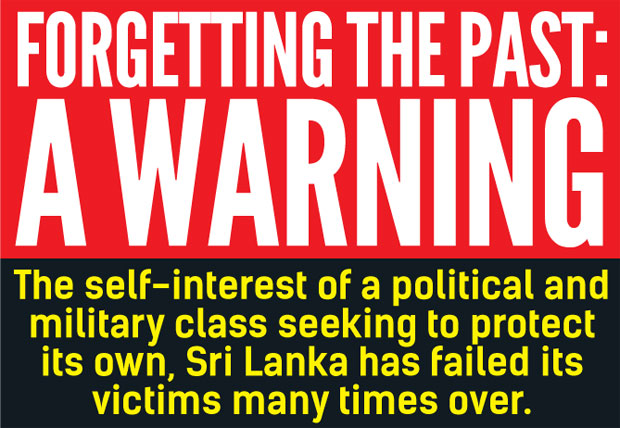Reply To:
Name - Reply Comment
Last Updated : 2024-04-20 00:00:00


In Sri Lanka too, the day will be marked by events throughout the country. Tragically, this country has no lack of commemorative days on which victims respect their dead, remember their missing and confront their own buried grief. The proliferation of commemorative days—each community and sometimes each political party marking its own—highlights not merely the divisive nature of remembering the dead, but equally that mass scale political violence in Sri Lanka has left very few  groups untouched.
groups untouched.
Yet, unpardonably, the issue of doing good by victims—ensuring their rights to truth, justice, reparation and guarantees of non-recurrence—has become identified with one ethnic group and its political struggle.
Yet, from Sinhala villages in the South to the Muslim villages in the East and Tamil ones in the North, there is a remarkable confluence of experiences, grievances and demands.
The final report of the Government appointed Consultation Task Force on Reconciliation chaired by Mrs. Manouri Muttettuwegama reaches precisely this conclusion after an almost year-long comprehensive survey of victims’ voices throughout the country. Gehan Gunatilleke’s book “Confronting the Complexity of Loss” published by the Law and Society Trust makes a similar point: That at the level of victims, there is a marked absence of the levels of political contestation surrounding questions of truth and justice relative to the media and political discourse.
The powerful idea behind the Task Force’s and Gunatilleka’s thesis, that victims of all ethnicities do broadly want the same outcomes, and that factors entirely unrelated to ethnicity account for the differences in victims’ perspectives, has been woefully underutilised in domestic advocacy in favour of truth and justice.
The consequences of that underutilisation are serious. For one, the misapprehension that Transitional Justice is about doing right by victims of the Tamil community alone creates the space for ethnically charged mobilisations against the idea.
Second, the burden of carrying the agenda of victims’ rights politically then falls on the political class of one community, while it is assiduously avoided by others.
Third, even the victims’ demands projected by that political class—because it is met with resistance from others—eventually assumes a parochial and odiously communal character, as evidenced by the pronouncements of fringe Tamil civil society outfits and political groups.
The nett result is that victims’ rights have become politicised beyond measure, with victims on all sides silenced by those who wished to use them as pawns. The State’s callous disregard for victims is thus mirrored by the ostensible champions of victims themselves, with tragic consequences.
As we approach seven decades since Independence, and for all this country’s signal achievements in a multitude of areas, one of many striking failures is the sheer level of political violence we have countenanced on this soil.
The intensity and brutality of the violations we have witnessed often mirror and match societies blighted with the curses we have not: famine, complete State failure, war-lordism and economic breakdown. Whatever one may believe about the occurrences during the last stages of the war, no one can deny that over thirty years of civil war in the North and two insurrections in the South, the nature of the violence on display committed by all sides in this otherwise fertile land of self-effacing people would shock the conscience of anyone.
And yet, remedial measures to do right by victims and prevent a recurrence have been few. It has become somewhat fashionable now to speak of the masses as forgetful and forgiving, particularly in relation to the failings and foibles of politicians.
This mentality often animates discussions around truth and justice: forget and move on has now been elevated to the status of a policy prescription.
Perhaps for this reason, and most likely for others, including the self-interest of a political and military class seeking to protect its own, Sri Lanka has failed its victims many times over.
Whatever one’s assumptions about the capacity of the general populace to remember, victims do not forget because they cannot.
For most victims who struggle at the bottom of the economic pile, even the misery of everyday poverty is amplified by the loss of a breadwinner, guardian or partner.
If this were not sufficient reason to compel action, there is the chilling reminder that the modes of mass atrocity once practised do not disappear.
It is the very torture techniques perfected in the war against the LTTE that the National Human Rights Commission tells us are now being perpetrated against petty criminals throughout the country.
Enforced disappearances first targeted rebellious Sinhala youth, but later came to characterise a method of institutionalised fear that gripped an entire country.
Judging by recent revelations, we may not have seen the last of political assassinations either.
George Santayana told us that those who did not remember the past were condemned to repeat it. For Sri Lanka, this is not merely a wise proverb. It is a prescient warning.

Add comment
Comments will be edited (grammar, spelling and slang) and authorized at the discretion of Daily Mirror online. The website also has the right not to publish selected comments.
Reply To:
Name - Reply Comment
On March 26, a couple arriving from Thailand was arrested with 88 live animal
According to villagers from Naula-Moragolla out of 105 families 80 can afford
Is the situation in Sri Lanka so grim that locals harbour hope that they coul
A recent post on social media revealed that three purple-faced langurs near t